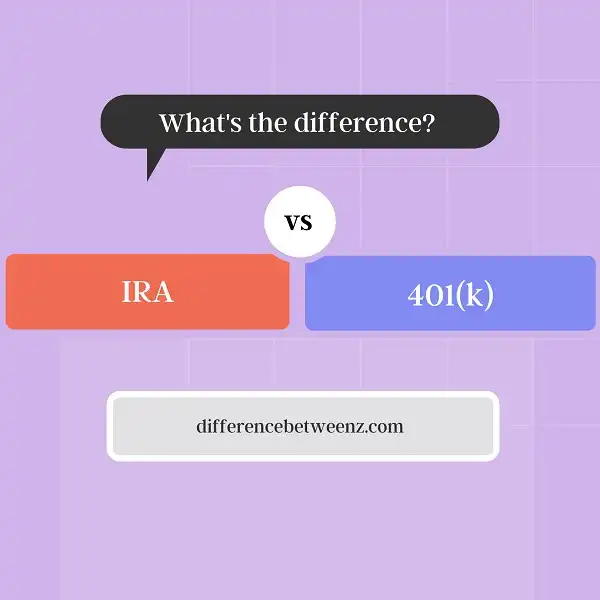There are many different retirement savings options available to employees in the United States. Two of the most common are the IRA and 401(k) plans. While they have similarities, there are some key differences between these two types of plans. In this blog post, we will explore those differences and help you decide which plan might be best for you.
What is IRA?
An IRA is an individual retirement account that offers tax advantages to encourage saving for retirement. Anyone with earned income, including self-employment income, can contribute to an IRA. Contributions may be made in cash or by rollover from another eligible retirement plan. Earnings in the account are tax-deferred until withdrawn. With a traditional IRA, contributions may be tax-deductible, and withdrawals are taxed as ordinary income. With a Roth IRA, contributions are not tax-deductible, but withdrawals are tax-free if certain conditions are met.
What is 401(k)?
A 401(k) is a retirement savings plan that allows individuals to invest pre-tax dollars into an account that can be used later to fund their retirement. This type of plan is typically offered by employers as a benefit to their employees, and contributions are often matched by the employer. Unlike traditional pensions, which guarantee a set amount of monthly income after retirement, 401(k) plans allow workers to manage their savings themselves to determine how much income they need in retirement. Additionally, with 401(k)s, individuals have more control over when they decide to withdraw money from their savings. Overall, a 401(k) is a valuable tool for preparing for retirement and helping individuals secure their financial future.
Difference between IRA and 401(k)
The differences between an IRA and a 401(k) can be somewhat confusing, as these two savings vehicles serve similar purposes. An IRA, or individual retirement account, is designed to help people save for retirement. Unlike a 401(k), which many employers offer to their employees as part of their benefits package, an IRA is typically funded with personal contributions from the investor. With a 401(k) plan, taxes are deferred on contributions and earnings until the money is withdrawn in retirement. By contrast, contributions to an IRA are tax-deductible up to certain limits, and earnings on the investments grow tax-free until withdrawal. Furthermore, an IRA has more investment options than a traditional 401(k), since it does not involve employer contributions and therefore is not subject to any restrictions imposed by the plan sponsor. Overall, while an IRA and a 401(k) shares many of the same benefits and features, there are some important differences that should be considered when choosing one or the other.
Conclusion
The biggest difference between an IRA and 401(k) is that with a 401(k), your employer may match your contributions. This means that for every dollar you contribute, your company will also contribute one dollar, which can really add up over time. Another key difference is that you can’t touch the money in your IRA until you reach retirement age, while you can access funds from a 401(k) at any time (although there may be penalties for withdrawing them early). If you’re trying to decide whether to invest in an IRA or a 401(k), it’s important to consider both the matching benefits and the withdrawal flexibility of each option.


